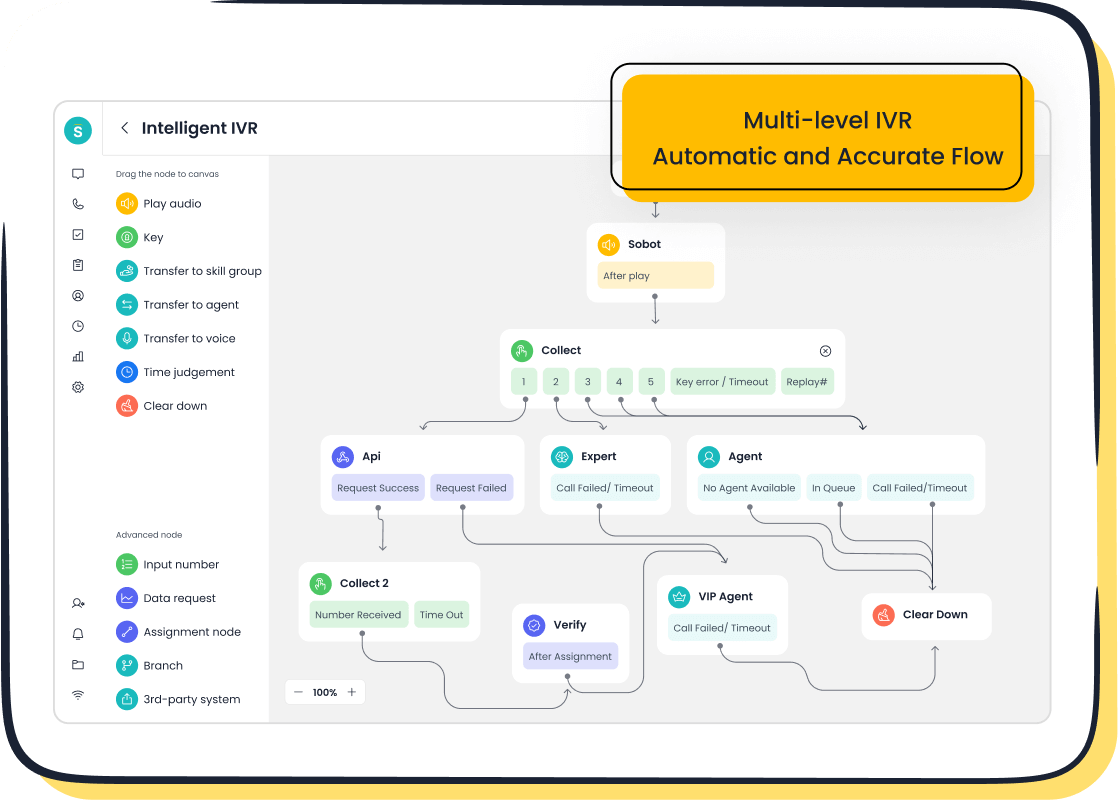Strategies for Dynamic Call Center Scripting with AI

AI has revolutionized call center scripting, enabling businesses to deliver more personalized and efficient customer interactions. By 2021, over half of call centers had adopted AI strategies, showcasing a growing trend toward smarter customer service solutions. Dynamic scripts, powered by AI, adapt in real-time to customer needs, ensuring consistent responses and faster issue resolution. These scripts streamline conversations, helping agents manage calls effectively while bridging knowledge gaps. Companies like Sobot leverage AI to provide intelligent tools, such as their Voice Call Center, which enhances operational efficiency and customer satisfaction through features like smart call routing and AI-powered Voicebots.
Understanding Dynamic Call Center Scripting
What Makes Call Center Scripting Dynamic?
Definition and characteristics of dynamic scripts.
Dynamic call center scripting refers to scripts that adapt in real-time based on customer interactions. Unlike static scripts, dynamic ones leverage AI to adjust responses according to the context of the conversation. These scripts analyze customer data, such as past interactions or preferences, to provide tailored solutions. For example, if a customer frequently contacts support about a specific product, the script can prioritize relevant information. This adaptability ensures smoother communication and enhances customer satisfaction.
Dynamic scripts also empower agents by offering suggestions during calls. These prompts help agents address customer needs more effectively. With AI, dynamic scripts continuously evolve, learning from each interaction to improve future responses. This makes them a powerful tool for modern call centers.
Differences between static and dynamic scripts.

Static scripts follow a rigid structure, offering the same responses regardless of the situation. They lack flexibility and personalization, which can make interactions feel robotic. In contrast, dynamic scripts adapt to the flow of the conversation. AI enables this adaptability by analyzing real-time data and customer intent. For instance, Sobot's Voice Call Center uses AI-powered Voicebots to recognize intent and adjust scripts accordingly. This ensures that every interaction feels personalized and relevant.
The Role of AI in Dynamic Scripting
How AI personalizes and adapts scripts in real-time.
AI transforms call center scripting by enabling real-time personalization. It processes customer data during interactions, identifying patterns and preferences. This allows scripts to adjust dynamically, ensuring responses align with customer needs. For example, AI can detect a frustrated tone and suggest empathetic responses to the agent. This capability not only improves customer satisfaction but also boosts agent confidence.

Sobot's AI-powered solutions exemplify this. Their intelligent IVR system routes calls to the right agents, while the AI-powered Voicebot adapts scripts based on customer intent. These features streamline operations and enhance the overall customer experience.
Examples of AI applications in dynamic scripting.
AI applications in dynamic scripting are diverse. Sentiment analysis tools detect emotions in a customer's voice, prompting agents to adjust their tone. Machine learning models analyze historical data to predict customer needs, enabling proactive responses. For instance, if a customer frequently asks about shipping, the script can preemptively provide tracking details.

Sobot's Voice Call Center integrates these AI capabilities seamlessly. Its smart call routing and real-time monitoring ensure that agents have the right tools to handle any situation. This leads to faster resolutions and happier customers.
Challenges with Traditional Call Center Scripts
Limitations in flexibility and personalization.
Traditional call center scripts often fall short in meeting customer expectations.
- Agents feel constrained by lengthy scripts, leading to robotic delivery.
- Canned responses create a sense of inauthenticity, making interactions less personal.
- Rigid scripts prevent agents from adapting to unique customer needs, hindering personalized service.
These limitations highlight the need for dynamic scripting powered by AI.
Inefficiencies in updating and maintaining static scripts.
Maintaining static scripts can be time-consuming and inefficient.
- Regular reviews are necessary to keep scripts relevant.
- Feedback from agents helps identify usability issues.
- Customer feedback is crucial for recognizing pain points and improving scripts.
AI simplifies this process by automating updates and learning from interactions. Sobot's solutions, for instance, use AI to refine scripts continuously, ensuring they remain effective and up-to-date.
AI-Powered Tools for Call Center Scripting Optimization
Natural Language Processing (NLP) in Scripting
Understanding customer intent and generating human-like responses.
Natural Language Processing (NLP) enhances your call center's ability to understand customer intent. It breaks down speech and text into syntax and semantics, uncovering the meaning behind every interaction. By analyzing sentiment, NLP identifies emotions like frustration or satisfaction. This insight helps prioritize calls and route them to the right agents. For example, if a customer sounds upset, NLP can suggest empathetic responses to improve the experience.

NLP also generates human-like responses by processing grammar and context. It supports multilingual communication, making your call center accessible to diverse audiences. Over time, NLP learns from interactions, improving its accuracy and effectiveness. With tools like Sobot's AI-powered Voicebot, you can leverage NLP to deliver personalized and efficient customer service.
Real-world applications of NLP in call centers.
NLP has transformed call center optimization through practical applications:
- It routes callers to the most suitable agents, reducing resolution times.
- It assesses customer sentiment, prioritizing calls from frustrated customers.
- It generates tailored scripts for agents, enhancing interaction quality.
- It powers chatbots, enabling them to understand and respond to user input.
- It supports multilingual communication, broadening your service reach.
Sobot's Voice Call Center integrates NLP to streamline operations and improve customer satisfaction.
Machine Learning for Script Optimization
Training AI models with customer interaction data.
Machine learning uses customer interaction data to train AI models. It identifies patterns in workflows and suggests improvements, such as additional agent training. By analyzing data, machine learning provides real-time suggestions to agents, helping them make better decisions. For instance, it can recommend proactive alerts during complex scenarios, ensuring smoother interactions.
Continuous learning to refine scripts.
Machine learning continuously learns from customer interactions. This process refines algorithms, improving their ability to handle queries. Insights from analytics help optimize scripts, ensuring they stay relevant. Sobot's solutions use machine learning to enhance performance, delivering better outcomes for your call center.
Sentiment Analysis and Real-Time Adaptation
Using sentiment analysis to adjust scripts dynamically.
Sentiment analysis evaluates customer emotions during interactions. It enables agents to adjust their tone and language in real-time, creating more personalized experiences. For example, recognizing frustration allows agents to respond with empathy, improving satisfaction.
Enhancing customer engagement with real-time insights.
Real-time analytics from sentiment analysis uncover trends and root causes of dissatisfaction. These insights help you improve customer profiles and identify sales opportunities. Sobot's AI tools use sentiment analysis to boost engagement and optimize performance.
Sobot's Voice/Call Center AI Capabilities
Intelligent IVR and smart call routing for dynamic scripting
Sobot's Intelligent IVR system simplifies customer interactions by customizing greetings and building intuitive call menus. This feature ensures that customers reach the right department or agent without unnecessary delays. Intelligent call routing plays a key role here. It uses advanced algorithms to analyze customer data and direct calls to the most suitable agent or team. For example, if a customer has a history of technical issues, the system routes the call to a technical support specialist. This targeted approach reduces call handling time and improves resolution rates.
Intelligent call routing also adapts to real-time scenarios. If an agent becomes unavailable, the system redirects the call to another qualified team member. This ensures uninterrupted service and enhances customer satisfaction. By integrating voice AI technology, Sobot's system provides seamless and efficient call management, making it easier for you to deliver exceptional service.
AI-powered Voicebot for real-time interaction and intent recognition

Sobot's AI-powered Voicebot transforms how you handle customer interactions. It uses voice AI technology to recognize customer intent during calls, enabling real-time script adjustments. This capability ensures that responses align with the customer's needs, creating a more personalized experience. For instance, if a customer inquires about order status, the Voicebot retrieves the relevant details instantly, saving time for both the customer and the agent.
The Voicebot also supports multilingual communication, making it ideal for businesses with diverse customer bases. By utilizing voice AI to enhance script effectiveness, you can handle routine inquiries efficiently while freeing up agents to focus on complex issues. The benefits of using voice AI extend beyond efficiency. It improves customer satisfaction by delivering accurate and timely responses, ensuring every interaction feels meaningful.
Tip: Integrating voice AI into your call center not only boosts productivity but also enhances the overall customer experience.
Key AI-Driven Strategies for Dynamic Script Development
Leveraging Customer Data for Personalization
Analyzing historical data to identify customer needs.
AI enables you to analyze historical data to uncover patterns in customer behavior. This analysis helps you identify recurring issues, preferences, and needs. For example, if a customer frequently contacts your call center about product returns, AI can flag this trend. Your agents can then proactively address the issue by offering tailored solutions during the next interaction. This approach not only improves customer satisfaction but also streamlines call center optimization.
By leveraging customer data, you can also enhance personalization in call center scripting. AI tools like Sobot's Voice Call Center provide agents with comprehensive customer profiles. These profiles include past interactions, enabling agents to assist without requiring customers to repeat themselves. This creates a seamless and efficient customer experience.
Segmenting customers for tailored scripting.
Customer segmentation allows you to craft dynamic cold calling scripts that resonate with specific groups. AI-driven strategies analyze customer demographics, purchase history, and preferences to create these segments. For instance, you can group customers based on their interest in specific products or services. This segmentation ensures that your scripts address unique needs, making interactions more relevant and engaging.
Sobot's AI-powered solutions excel in this area. They use advanced analytics to segment customers effectively, enabling you to deliver personalized promotions and offers. This strategy not only boosts performance but also strengthens customer loyalty.
Predictive Analytics for Proactive Scripting
Anticipating customer needs with AI insights.
Predictive analytics empowers you to anticipate customer needs before they arise. AI uses data mining and machine learning to forecast future outcomes. For example, it can predict when a customer might need a product replacement or service renewal. This allows your agents to offer proactive support, reducing the need for customers to initiate contact.
By integrating predictive analytics into your call center scripting, you can enhance decision-making and improve customer interactions. Sobot's solutions leverage these insights to minimize hold times and direct calls to the most suitable agents, ensuring a smoother experience.
Addressing potential issues before they arise.
AI insights help you address potential issues proactively. For instance, sentiment analysis can identify dissatisfaction trends in customer interactions. You can then use this information to refine your scripts and train your agents.
| Example | Description |
|---|---|
| Sentiment Analysis in Live Interactions | AI tools provide real-time feedback to agents, suggesting corrective strategies. |
| Predictive Communication | Airlines use AI to anticipate common inquiries during disruptions. |
| Automated Responses | Utility companies automate replies to routine billing questions. |
These strategies improve performance optimization and enhance customer satisfaction.
Real-Time Feedback Integration
Adjusting scripts dynamically during live interactions.
Real-time analytics allow you to adjust scripts dynamically during calls. AI tools analyze customer sentiment and provide immediate suggestions to agents. For example, if a customer sounds frustrated, the system can recommend empathetic responses. This ensures that your agents deliver personalized and effective solutions.
Sobot's Voice Call Center integrates real-time agent assistance, enabling you to adapt to customer needs instantly. This feature enhances decision-making and improves overall performance.
Training agents to utilize AI-driven suggestions effectively.
Training your agents to use AI-driven suggestions is crucial for creating effective cold calling scripts. Encourage them to rely on real-time feedback during interactions. Use interaction analytics platforms to monitor key performance metrics and assess script effectiveness.
By leveraging AI tools, you can empower your agents to craft dynamic cold calling scripts that resonate with customers. This approach not only improves customer experience but also drives better business outcomes.
Testing and Iteration with AI
A/B testing to evaluate script performance.
A/B testing plays a crucial role in improving your call center scripts. It allows you to compare two script variations to determine which one performs better. For example, you can test different tones or phrases to see how they impact customer engagement. Tracking metrics like call duration helps you identify which scripts lead to faster resolutions. You can also measure follow-up agreements to understand which scripts resonate most with customers. Over time, this data reveals patterns that guide you toward more effective scripting.
Using A/B testing, you can refine dynamic cold calling scripts to boost conversion rates. For instance, testing a more empathetic tone might result in higher customer satisfaction. Sobot's Voice Call Center supports this process by providing tools to track and analyze call data. These insights help you make informed decisions, ensuring your scripts align with customer expectations.
Refining scripts based on AI-driven analytics.
AI-driven analytics takes script optimization to the next level. By analyzing customer interactions, AI identifies areas for improvement in real-time. For instance, it can detect when a script fails to address a common concern, prompting you to make adjustments. This continuous feedback loop ensures your scripts remain relevant and effective.
Sobot's solutions excel in leveraging analytics for script refinement. The platform uses machine learning to analyze call data, uncovering trends and customer preferences. For example, if analytics show that customers frequently ask about delivery times, you can update your scripts to address this proactively. This approach not only enhances customer satisfaction but also improves operational efficiency.
Tip: Regularly updating your scripts based on AI insights keeps them fresh and aligned with customer needs.
Benefits of AI-Driven Call Center Scripting
Enhanced Customer Satisfaction
Delivering personalized and relevant responses.
AI-driven call center scripting ensures every interaction feels tailored to the customer. By analyzing historical data, AI identifies preferences and patterns, enabling agents to provide relevant solutions. For example, if a customer frequently inquires about a specific service, the script prioritizes that topic. This approach fosters trust and loyalty by addressing individual needs.
AI also ensures consistency in communication. Uniform responses across all channels enhance brand reliability. Tools like Sobot's Voice Call Center use AI to guide agents with real-time suggestions, ensuring accurate and empathetic responses. This structured guidance reduces errors and improves the overall customer experience.
Resolving issues more efficiently with AI support.
AI optimizes issue resolution by automating repetitive tasks and providing instant insights. For instance, it routes calls to the most suitable agent, reducing wait times. AI-powered tools also handle FAQs, allowing agents to focus on complex queries.
| Evidence Description | Impact |
|---|---|
| Shortened Resolution Times | AI reduces average handling time (AHT) by 40%. |
| First-call resolution rates increase | Improved by 25%, boosting satisfaction. |
| Automated Call Routing | Instantly connects customers to the correct department. |
These capabilities, integrated into Sobot's solutions, ensure faster resolutions and happier customers.
Improved Operational Efficiency
Reducing average handling time with optimized scripts.
AI reduces average handling time by automating time-consuming tasks like call routing and after-call summaries. It provides agents with live guidance, offering scripts and response suggestions instantly. This efficiency allows agents to resolve issues faster, improving productivity.
Sobot's Voice Call Center excels in this area. Its AI tools streamline workflows, reducing manual effort and enhancing performance optimization. By minimizing repetitive tasks, agents can focus on delivering quality service.
Automating routine tasks to free up agent time.
Automation plays a key role in improving operational efficiency. AI handles routine inquiries, such as billing questions, without agent involvement. This reduces the need for additional staff and lowers operational costs.
For example, Sobot's AI-powered Voicebot manages thousands of calls simultaneously, ensuring uninterrupted service. This automation not only boosts efficiency but also enhances customer satisfaction by providing timely responses.
Boosted Agent Performance
Providing real-time guidance and support to agents.
AI empowers agents with real-time coaching during calls. It analyzes live interactions, offering tips on tone, language, and problem-solving. This guidance helps agents navigate complex scenarios confidently.
Sobot's solutions provide real-time analytics, enabling agents to tailor their approach based on customer sentiment. This support improves performance and ensures a seamless customer experience.
Reducing stress and improving confidence with AI tools.
AI reduces agent stress by automating administrative tasks like call logging and ticket creation. This allows agents to focus on customer engagement. Training opportunities provided by AI also enhance agent confidence. For instance, Sobot's tools analyze calls to identify training needs, ensuring agents receive targeted support.
By simplifying workflows and offering continuous learning, AI fosters a positive work environment. Agents feel more equipped to handle challenges, leading to better performance and higher job satisfaction.
Scalability and Cost Savings
Automating processes to handle higher call volumes.
AI-driven solutions empower your call center to scale operations effortlessly, even during peak periods. By leveraging conversational AI and chatbot technologies, you can manage common customer requests without overwhelming your human agents. These virtual agents handle routine inquiries, allowing your team to focus on complex issues. For example, AI-powered systems like Sobot's Voice Call Center manage thousands of calls simultaneously, ensuring consistent service quality and low latency. This capability proves invaluable during seasonal spikes when call volumes surge.
AI also enhances scalability by maintaining operational efficiency. Intelligent call routing ensures customers connect with the right agents, reducing wait times. Additionally, tools like sentiment analysis prioritize urgent calls, enabling faster resolutions. With these features, your call center can handle 2-3 times more inquiries without increasing staff, ensuring seamless customer experiences.
Reducing operational costs with AI-driven solutions.
AI significantly reduces operational costs by optimizing workflows and automating repetitive tasks. For instance, virtual agents and chatbots eliminate the need for additional staffing, lowering payroll expenses. Self-service options further reduce costs by enabling customers to resolve issues independently. Sobot's AI-powered Voicebot exemplifies this by handling routine inquiries, freeing agents to focus on high-value interactions.
| Cost-Saving Aspect | Description |
|---|---|
| Automation | AI automates repetitive tasks, reducing the need for human agents and lowering staffing costs. |
| Operational Efficiency | AI optimizes workflows, leading to a significant decrease in operational expenses. |
| Handling Increased Volume | AI enables handling 2-3 times more inquiries without increasing staff, thus saving costs. |
| Self-Service Options | AI allows customers to resolve issues independently, further reducing the need for human intervention. |
By integrating AI tools like Sobot's Voice Call Center, you can achieve cost savings while maintaining high service standards. These solutions not only reduce overhead but also improve customer satisfaction, creating a win-win scenario for your business.
Overcoming Challenges in AI Script Implementation
Addressing Data Privacy and Security
Ensuring compliance with data protection regulations.
AI integration in call centers requires strict adherence to data protection regulations like GDPR and HIPAA. You can ensure compliance by implementing several key measures:
- Conduct thorough assessments of all data entering and exiting your AI systems. This ensures alignment with privacy laws.
- Use robust encryption to safeguard sensitive information during storage and transmission.
- Limit data access to authorized personnel through strict access controls.
- Develop transparent data policies to inform customers about how their data is used.
- Regularly review and update security protocols to adapt to evolving regulations.
These steps not only protect customer data but also build a foundation for secure AI-driven call center optimization.
Building customer trust through transparency.
Transparency plays a vital role in earning customer trust. You should disclose how AI systems handle personal data and provide clear opt-in options for data collection. AI tools like Sobot's Voice Call Center can automate consent management, ensuring compliance while enhancing decision-making. By prioritizing transparency, you demonstrate a commitment to ethical practices, fostering long-term customer loyalty.
Managing Change in Call Center Operations
Training agents to adopt AI tools effectively.
Training your agents is essential for successful AI adoption. Comprehensive training ensures agents understand new tools and workflows. For example, Sobot's real-time agent assistance provides live guidance, helping agents navigate AI-driven systems confidently. Ongoing support further enhances performance by addressing challenges as they arise.
| Strategy | Description |
|---|---|
| Comprehensive Training | Familiarizes agents with AI tools for seamless integration. |
| Ongoing Training and Support | Provides continuous education to improve tool utilization and effectiveness. |
| AI as a Training Tool | Offers operational insights and enhances customer experience. |
Demonstrating the value of AI-driven strategies to stakeholders.
Gaining stakeholder support requires clear communication of AI's benefits. Start by conducting workshops to educate stakeholders about AI's role in enhanced decision-making. Share success stories, such as Sobot's collaboration with Agilent, which resulted in a sixfold increase in efficiency. Pilot projects showcasing measurable improvements can further demonstrate AI's value. Involve stakeholders in the implementation process to address concerns and highlight how AI augments human capabilities.
Ensuring Script Accuracy and Relevance
Regularly updating AI models with new data.
AI models require regular updates to maintain accuracy. Continuous integration and deployment (CI/CD) pipelines ensure timely retraining with fresh data. MLOps automates the detection of model drift, keeping your scripts relevant. For example, Sobot's analytics tools monitor performance and refine scripts based on real-time insights. This approach ensures your call center remains agile and effective.
Monitoring performance to avoid outdated responses.
Monitoring script performance is crucial for avoiding outdated responses. Use AI-driven analytics to track key metrics like customer satisfaction and resolution times. Automated validation methods can identify gaps in script effectiveness, prompting timely updates. By leveraging tools like Sobot's Voice Call Center, you can maintain high-quality interactions and optimize call center performance.
Balancing Automation with Human Touch
Identifying when human intervention is necessary.
Automation can handle many routine tasks in a call center, but knowing when to involve a human agent is crucial. AI tools excel at managing repetitive inquiries, such as order tracking or account updates. However, complex issues often require human judgment and empathy. For example, a customer disputing a billing error may need reassurance and a detailed explanation. In such cases, human intervention ensures the customer feels heard and valued.
AI can assist in identifying these moments. Sentiment analysis tools detect frustration or confusion in a customer's tone, signaling the need for a live agent. This approach allows you to allocate resources efficiently. By letting automation handle straightforward tasks, your agents can focus on resolving more complicated issues. This balance not only improves response accuracy but also enhances overall customer satisfaction.
Maintaining empathy in customer interactions.
Empathy remains a cornerstone of excellent customer service. While automation speeds up processes, it cannot replicate the emotional connection a human agent provides. Customers often seek understanding, especially during stressful situations. For instance, a customer calling about a delayed shipment may appreciate an empathetic acknowledgment of their frustration.
AI supports this by equipping agents with real-time insights. Tools like Sobot's Voice Call Center analyze customer sentiment and suggest empathetic responses. This guidance helps agents maintain a personal touch, even during high-pressure interactions. Additionally, by automating routine tasks, AI gives agents more time to engage meaningfully with customers. This combination of technology and human connection ensures a high level of service performance while fostering trust and loyalty.
Tip: Use AI to enhance, not replace, human interaction. This strategy ensures your call center delivers both efficiency and empathy.
AI has transformed call center scripting, making it more dynamic and effective. By adopting AI-driven strategies, you can deliver personalized experiences that meet customer expectations. These tools improve operational efficiency and agent performance, ensuring faster resolutions and higher satisfaction rates. For example, Sobot's Voice Call Center uses AI-powered features like intelligent IVR and real-time sentiment analysis to optimize interactions. Businesses that embrace these solutions stay competitive in today’s fast-paced service landscape. Start leveraging AI to enhance your call center operations and build stronger customer relationships.
FAQ
What is the main advantage of AI-driven call center scripting?
AI-driven scripting adapts to real-time interactions, ensuring personalized responses. It improves efficiency by automating routine tasks and providing agents with actionable insights. For example, Sobot's Voice Call Center uses AI to optimize call routing and script adjustments, enhancing both agent performance and customer satisfaction.
How does sentiment analysis improve call center interactions?
Sentiment analysis detects emotions in a customer's tone or language. It helps agents adjust their approach, ensuring empathetic and effective communication. Sobot's AI tools use this technology to provide real-time suggestions, improving engagement and resolution rates.
Can AI scripting handle multilingual communication?
Yes, AI scripting supports multilingual communication. Tools like Sobot's AI-powered Voicebot process multiple languages, making your call center accessible to diverse audiences. This capability ensures consistent service quality, regardless of the customer's language preference.
How does AI ensure script accuracy over time?
AI continuously learns from interactions, refining scripts based on real-time data. For instance, Sobot's solutions use machine learning to analyze call trends and update scripts automatically. This ensures your scripts remain relevant and effective as customer needs evolve.
Is AI scripting suitable for small businesses?
AI scripting benefits businesses of all sizes. Small businesses can use tools like Sobot's Voice Call Center to automate routine tasks and improve efficiency. This reduces operational costs while delivering high-quality customer service, making it a cost-effective solution.
See Also
Exploring AI Software Solutions for Call Centers
Evaluating AI Solutions for Enterprise Call Centers
Understanding the Efficiency of Call Center Automation
